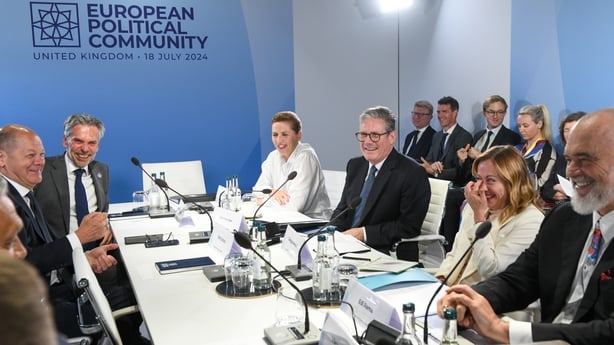When British Prime Minister Keir Starmer and his officials arrived at Chequers on Wednesday evening, it was a first for many of them.
As they got out of the motorcade, some of them looked mesmerised by the surroundings.
However, there was little time to take it all in.
The new Prime Minister, just 12 days into his role, was about to welcome his first guest to his country retreat - Taoiseach Simon Harris.
His Irish counterpart was the first foreign leader to visit the UK since Mr Starmer took office.
Both leaders exchanged warm words before their meeting got under way.
On the sidelines was Sue Grey, Mr Starmer's chief of staff and daughter of Irish immigrants.
It was perhaps an indication that this was more than a photo opportunity but rather a chance for both sides to develop real plans to "reset" Anglo-Irish relations.
According to Mr Starmer, it was time to "move on to the next chapter" and develop "a stronger and deeper relationship".
At the request of both leaders, they were given time alone to walk the grounds and discuss what they felt the "reset" in relations should look like. Afterwards, they sat down with their officials for a working dinner.
Altogether it was a visit that lasted almost two hours. The atmosphere was a warm one.
During dinner, Mr Starmer reflected on his honeymoon in Donegal, when he had bought a Donegal jersey.
Simon Harris seized the moment to present Mr Starmer with a gift of a new Donegal jersey to add to his collection.
In return, Mr Harris was presented with a Downing Street whiskey decanter set.
Niceties aside there was business discussed too.
When the visit wrapped up, the Taoiseach spoke to the Irish press assembled outside.
It was an "excellent" meeting he claimed and he could not "overstate" its significance.
Keir Starmer had agreed to visit Dublin on 7 September, to coincide with the football match between the Republic of Ireland and England in the Aviva Stadium.
Both leaders also agreed to annual summits, that would allow the two governments to work on shared initiatives.
It would be different to other forums already in place, Mr Harris insisted.

During opening of parliament earlier that day, a commitment to repeal and replace the controversial Northern Ireland Legacy Act was included in the King's speech.
It led to questions as to whether Ireland would now end its inter-state case against the UK in relation to the act.
"This is step by step. Today was a very significant day," Simon Harris told reporters. He stopped short of saying that Ireland would withdraw its case but added that both governments would work together on replacing the Legacy Act.
The main message from the evening seemed to be that the "reset" of relations was real and with follow up visits and summits now in the calendar, progress will be closely watched.
European Reset
Hours later both leaders would meet again at the gathering of the European Political Community.
It was a key opportunity for Keir Starmer to also make progress in resetting the UK government's relationship with the European Union.
The summit took place at Blenheim Palace, the birthplace of wartime leader Winston Churchill.
The theme of the event was European security.
Before it got under way, Mr Starmer spoke of a closer relationship with Europe in the area of migration and specifically border security.
Through the sharing of data and expertise, the new Prime Minister insisted that his government could make more progress than the previous one in "smashing the gangs" involved in people smuggling.
When the event wrapped up, Mr Starmer took the opportunity to congratulate Ursula von der Leyen on securing a second term as European Commission President earlier that day.
Some have pondered as to whether he will seek an engagement with Ms von der Leyen in the near future.
It marked a significant change in tone from the British government, one that was warmly welcomed by many of those present at the event.
The key message of the day as summed up by one senior figure was that the United Kingdom may have left the European Union but it was still European.
Later that evening, Mr Starmer hosted a dinner with French President Emanuel Macron.
The next morning, Ukrainian President Volodymyr Zelensky was given the rare opportunity to address an extraordinary meeting of the UK cabinet.
Keir Starmer has used his first two weeks to reassure European neighbours that UK is now a proactive member of the European community.
He also appears to have convinced many in the Irish Government that his desire to reset the Anglo-Irish relationship is genuine.
The focus will now turn to what the new chapter brings.







